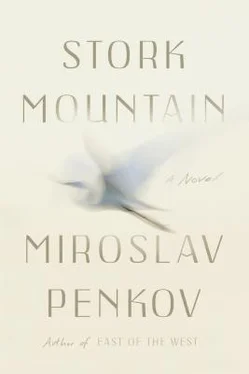Miroslav Penkov - Stork Mountain
Здесь есть возможность читать онлайн «Miroslav Penkov - Stork Mountain» весь текст электронной книги совершенно бесплатно (целиком полную версию без сокращений). В некоторых случаях можно слушать аудио, скачать через торрент в формате fb2 и присутствует краткое содержание. Год выпуска: 2016, Издательство: Farrar, Straus and Giroux, Жанр: Современная проза, на английском языке. Описание произведения, (предисловие) а так же отзывы посетителей доступны на портале библиотеки ЛибКат.
- Название:Stork Mountain
- Автор:
- Издательство:Farrar, Straus and Giroux
- Жанр:
- Год:2016
- ISBN:нет данных
- Рейтинг книги:4 / 5. Голосов: 1
-
Избранное:Добавить в избранное
- Отзывы:
-
Ваша оценка:
- 80
- 1
- 2
- 3
- 4
- 5
Stork Mountain: краткое содержание, описание и аннотация
Предлагаем к чтению аннотацию, описание, краткое содержание или предисловие (зависит от того, что написал сам автор книги «Stork Mountain»). Если вы не нашли необходимую информацию о книге — напишите в комментариях, мы постараемся отыскать её.
Stork Mountain — читать онлайн бесплатно полную книгу (весь текст) целиком
Ниже представлен текст книги, разбитый по страницам. Система сохранения места последней прочитанной страницы, позволяет с удобством читать онлайн бесплатно книгу «Stork Mountain», без необходимости каждый раз заново искать на чём Вы остановились. Поставьте закладку, и сможете в любой момент перейти на страницу, на которой закончили чтение.
Интервал:
Закладка:
“Nonsense,” I cried. The ownership deed was completely valid. And Grandpa owned not just the school, but all the other houses. He’d bought them, fair and square, and later he’d transferred them, school and houses, all to my name.
“Poor boy.” The imam laughed a fake laugh. “Is that what he’s told you?”
And then, with a self-satisfaction I’d mistaken for kindness, he told me the rest of the story.
It was this story I was telling now, much too loudly, to Elif and Grandpa. I had run all the way back after seeing the imam to find them eating lunch on the terrace.
Here was the gist, fair and square: in the mid-sixties every single family from the Christian hamlet had been moved to the city. A state-mandated urbanization, all through Bulgaria. As compensation, in exchange for their houses, the families had been given city apartments — two entire blocks of flats in Burgas all for Klisurans. To put it plainly, in the mid-sixties the Christian hamlet had stopped being a village. The state had taken the land and transformed it into a border zone, a buffer.
Three years ago, the zone’s status was reconsidered. But the land was still the property of the state and it was the state that contracted a foreign company to build on it a complex of wind turbines. The construction had just begun — see right there the unfinished tower? — when my grandfather showed up, in his hand a sheet of paper.
Every Klisuran who’d owned a house had been given in exchange an apartment. Every ownership deed had been annulled. But Grandpa’s had fallen through the cracks somehow. Maybe because by that time he no longer lived in Klisura; maybe because some clerk had assumed the school must already be state-owned. After all, how could a school belong to a single person?
But it belonged to Grandpa, or so he claimed through this paper. Yet the state too had its papers, according to which no private entity could own land in the Christian hamlet.
It was a paradox. A legal casus. But until Grandpa’s deed was officially annulled, until the casus was resolved, there could be no construction of wind turbines — the law did not allow for power generators to be erected within residential limits.
“So they took you to court, Grandpa,” I said, and sat down in a chair, exhausted. “They thought, how hard could it be really, to prove your ownership deed was outdated and then annul it?”
“For three years your grandfather has jerked us around,” the imam had told me out in the courtyard. “Forgive my language, but better words allude me.”
“For three years, Grandpa,” I said now in his face on the terrace, “you’ve dragged out this lawsuit. That’s why you sold our family land, my share and my father’s. Even your city apartment. You needed money to pay your lawyers.”
Grandpa puffed out some air and reached for his lighter. “And you believe the imam?”
I watched him struggle to pull out a cigarette from the pack, and my heart grew heavy. To see this man the way I saw him now pained me something fierce. “I want to believe you ,” I told him. “So prove to me that we own these houses. Not once have I asked to see any papers. Now I’m asking.”
Trembling, he dabbed a cigarette against his mustache a few times. When he found his lips at last he lit up and gulped the smoke in.
“We have one document,” he admitted. “For this school building, which is yours now. I never owned any other houses.” Then he smoked hungrily, keeping his eyes low on the table. A rotten heaviness settled in my stomach. A wave of nausea. For months now he’d lied to my face.
“Look at me, Grandpa,” I told him. For there was more to the imam’s story.
Each time before a court hearing, Grandpa had faked some kind of sickness. Four strokes. One heart attack. A kidney stone crisis. Six times Grandpa had entered the hospital a week before his court dates.
“Is this what happened last month? When they destroyed the first two houses?”
He began to mumble and dropped his cigarette on the table. Fumbling to retrieve it, he spilled its tip into a shower of tiny sparks, which Elif beat down. When she looked up at me, her eyes themselves were casting sparks in showers. “You’re hurting him. Stop it!”
I could see he was hurting. But I couldn’t stop it. And why should I? So he wouldn’t fake another stroke?
“Did you fake it?” I said.
“For God’s sake, my boy! You were here. You saw me.”
“What about the strokes before that? The heart attack? Did you fake them?”
“For God’s sake. Maybe. But understand my position. I can’t let them build a wind farm right where the storks are nesting, right in the path of their migration. The turbines will kill them in thousands, it’s just that simple.”
“Why did you lie to me, Grandpa?” I said, so quietly that at first I wasn’t sure he’d heard me. For some time he struggled to light a new cigarette from the butt of the old one. Then he took a few deep drags.
“I was afraid,” he said. “I sold your land and left you nothing. I feared you’d run away if I told you the whole truth.”
He had feared correctly. But it went far beyond anger. “Tell me, Grandpa, what other lies have you told me? Is Lenio a lie? Or the nestinari ? And what about your teaching years?”
“All true, damn it,” he said, and slammed his fist on the table. The plates rattled. Saint Kosta jumped in the corner and, flapping his wings, hurled at us a cloud of gray dust.
“All true?” I said, and kept my eyes fixed on Grandpa’s, to see the kind of dirty flame that would ignite there.
“All true,” he said, this time more softly. And there was no flame in his eye, no twitch of his eyelid. He lied to me sweetly, the way you lie to a small child too gullible to catch your deception, or too weak to handle things as they really are.
“He’s lied before, your grandfather,” the imam had told me out in the mosque courtyard. “Ask him why the Communist Party dispatched him to teach in Klisura. With what objective. Ask him about the kind of lessons he taught his students. About the things they did to us, he and the priest, his comrade.”
My grandfather had not been exiled for his Party resignation. The Party had sent him to Klisura with his agreement. His mission — to indoctrinate the village Muslims. To make sure they grew up away from their roots; to make them believe they were truly Bulgarian.
But now on the terrace, I couldn’t stand to ask him. Not when he’d lied to me with such sweet softness. I heard myself speak as if from a great distance. How stupid did he think the storks were to fly in droves into the spinning turbines? And did he understand what these wind turbines would mean for Klisura? For the whole Strandja even? Could he imagine the jobs they’d create, the new investments?
“Please, spare us,” Elif said, and it was her voice, sharp and raspy from the cigarette she too was smoking, that brought me back from the distance. “You sound just like my father.”
“And you?” I said, and for a long time didn’t know what else to say, or how to say it. “I thought you took university classes. I thought you had exams coming. Isn’t this why you studied and why every day you rode the bus to Burgas?”
Her face turned pale, then flaming. And for this shame, she had a good reason. She’d dropped out of the university a full semester back and kept it a secret. Too many failed exams; too many fights with professors. Besides, attending college had never been about the classes. It had always been about defying her father.
“Your father had sold you like a goat, you told me. For fifteen thousand deutsche marks. Is this the price tag you’ve assigned yourself? Why not go higher? Twenty or thirty thousand? Or are you afraid no one would pay this much for you?”
Читать дальшеИнтервал:
Закладка:
Похожие книги на «Stork Mountain»
Представляем Вашему вниманию похожие книги на «Stork Mountain» списком для выбора. Мы отобрали схожую по названию и смыслу литературу в надежде предоставить читателям больше вариантов отыскать новые, интересные, ещё непрочитанные произведения.
Обсуждение, отзывы о книге «Stork Mountain» и просто собственные мнения читателей. Оставьте ваши комментарии, напишите, что Вы думаете о произведении, его смысле или главных героях. Укажите что конкретно понравилось, а что нет, и почему Вы так считаете.











